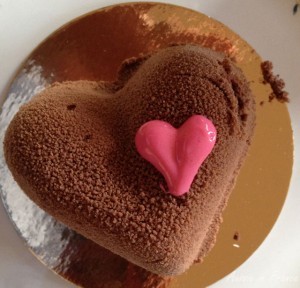How could I not talk about aimer on Valentine’s Day?
My first French boyfriend, many moons ago, told me that je t’aime beaucoup was not as strong as je t’aime on its own which seemed very strange to me. I already knew that je t’aime bien means “I like you” rather than “I love you” but I was surprised that je t’aime beaucoup didn’t mean “I love you very much”.
I was therefore equally surprised the first time Jean Michel said Je t’aime beaucoup. I explained what I had been told but he said he’d never heard of it. Yet my Collins/Robert bilingual dictionary says that aimer beaucoup means to like very much or to be very fond of. So who am I to believe?
Il l’aime d’amour means he really loves her. Elle est amoureuse means she’s in love. Il l’aime à la folie means he’s crazey about her or he adores her. Ils s’aiment means they love each other or they’re in love. Elle est amoureuse (de lui) = She’s in love (with him).
If je t’aime bien means “I like you”, how do you make the distinction between like and love when you’re not talking about people? For example, how would you say “I like chocolate” as opposed to “I love chocolate”? Well, you could say J’aime bien le chocolat or j’aime le chocolat and j’adore le chocolat.
There is no mistake about the last one – it means you’re a chocoholic (which incidentally is an accro au chocolat, accro being short for accroché meaning addict). J’aime bien le chocolat means you can take it or leave it and j’aime le chocolat means you like eating chocolate.
J’adore is one of the expressions that you hear all the time in French so much so that it is easy to forget that we don’t use “adore” in English in the same sense. You adore your children (well, most of the time), you worship the Lord (if you’re a believer) but you can only love chocolate.
J’adore le cinéma. J’adore le fromage. J’adore tout ce qui est français. J’adore sa façon de s’habiller. J’adore tremper mes tartines dans le chocolat chaud (I love dunking my bread in hot chocolate). You could go on forever …
If aimer is followed by mieux, it means “prefer”. J’aime mieux lire que d’écrire = I prefer reading to writing.
Love, of course, is amour but love at first sight is a coup de foudre or stroke of lightening, which is much more graphic, isn’t it?
All my love, Patrick = bises, Patrick while love and kisses or xxx = bisous, gros bisous ou grosse bises. However, if you want to say “Mark sends his love”, you’d say Marc t’envoie ses amitiés ou Marc t’embrasse, which is stronger.
In French, passion is often used to express love, but surprisingly, it usually applies to a hobby or passtime. Le théâtre était sa grande passion = the theatre was her (or his) great love. Sa première passion a été le foot = His first love was football.
He is the love of my life = c’est l’homme de ma vie but football is the love of her life = le foot est sa grande passion. Don’t you think that’s funny?
And here’s a proverb before we go. Love me, love my dog = Qui m’aime aime mon chien.






Ah, Rosemary, I should probably unsubscribe from your culinary posts because I’m getting fat just by reading them and looking at your photos …
Anda, this was a very little cake and wouldn’t do much damage.
Love it! J’adore ton blog Rosemary! (And that cake does look devine…)
Merci Phoebe! And the cake was devine …
This is very intriguing. Rosemary, i also heard that french women hate it when a man says “vous avez des beau sourire” (you have a lovely smile) . guess it is equivalent to “you are a nice person, but i dont find you sexy enough to fall in love with you”… 🙂
Well, I didn’t know about that. I can remember the first time a French man said “Tu as de beaux yeux”. It seemed such a cheesy line!
Huum, definitely a pick up line that one..:)
Merci, Rosemary ~ I think I’ve got it:
J’aime bien le chocolat, j’adore les cannoli, le voyage est ma grande passion, et mon mari c’est l’homme de ma vie!
Spot on! That’s exactly right. (One minor correction, we’d say “voyager est ma grande passion” using the infinitive).